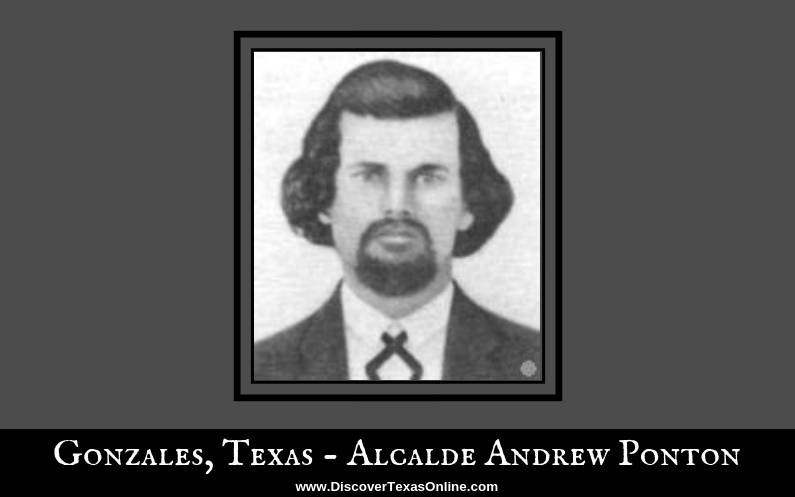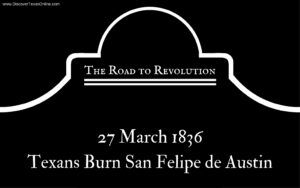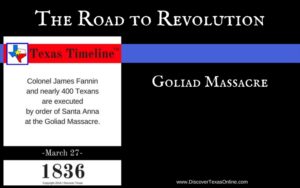 Alcalde was the title of the government official who acted as mayor of towns in early Texas. Though the alcalde of Gonzales did not play an active role in the Battle of Gonzales, the part he played was important.
Alcalde was the title of the government official who acted as mayor of towns in early Texas. Though the alcalde of Gonzales did not play an active role in the Battle of Gonzales, the part he played was important.
When President Santa Anna declared himself dictator, he tossed out the Constitution of 1824, dismissed the Mexican legislature, and directed the disarmament of private citizens. Santa Anna’s brother-in-law, General Martin Perfecto de Cos, was military commander in San Antonio. General Cos put Colonel Domingo Ugartechea in charge of retrieving a loaned cannon from Gonzales, and Colonel Ugartechea sent one Corporal DeLeon with several men to get it from Alcalde Andrew Ponton. They said it was “needed for defense of San Antonio”, even though there were several cannons in the arsenal at San Antonio and this cannon was a very small one that could not even be fired.
But Alcalde Ponton was a Texan and not much in favor of the centralistas who had taken over Mexico’s government. When Corporal DeLeon arrived with his message on September 25, 1835, Alcalde Ponton took a poll of Gonzales citizens. All but three voted against giving up the cannon, mostly as a matter of principle. They “detained” Corporal DeLeon and his party and disarmed them, instead. While the DeWitt colonists began preparing for trouble on September 26, Alcalde Ponton sent this official letter to Jefe-Politico Ramon Musquiz:
Gonzales
Sept 26th 1835
Excellent Sir,
I received an order purporting to have come from you for a certain piece of Ordnance which is in this place. It happened that I was absent an so was the remainder part of the Ayuntamto when your dispatch arrived in consequence the men who bore sd dispatch were necessarily detained untill to day for an answer. This is a matter of delicasy to me nor do I know without further information how to act this cannon was as I have always been informed given in perpetuity to this Town for its defense against the Indians. The dangers which existed at the time we received this cannon still exist and for the same purposes it is still needed here—our common enemy is still be dreaded or prepared against. How or in what manner such arms are appropriated throughout the country I am as yet ignorant but am led to believe that dippositions of this nature should be permanent at least as long as the procuring cause exists. I must therefore I hope be excused from delivering up the sd cannon untill I have obtained more information on the subject matter. At least untill I have an opportunity of consulting the chief of this department on the subject—as well to act without precipitation—as to perform strictly and clearly my duty, and I assure you, that if, after a mature deliberation on the subject, I find it be my duty & in justice to your self—I obligate my self to comply with your demands—and will without delay send the cannon to you.
God & Liberty—Andrew Ponton, Alcalde
It would be fair to say that Col. Ugartechea was not persuaded by the letter, since he immediately sent Lt. Francisco Castaneda with over a hundred men to demand the cannon and arrest the alcalde and any others who resisted, though he did direct them to avoid a confrontation if possible.
As he neared Gonzales, Lt. Castaneda sent advance messengers to request a meeting with Alcalde Ponton, but was informed that the alcalde was “not available” and that only he could make any official decision regarding the cannon. When he arrived on the west bank of the rain-swollen Guadalupe River on September 30, Casteneda again requested a meeting with the alcalde. Again he was told that Alcalde Ponton was “unavailable” but that he was expected back late in the afternoon. Sometime after 4 pm, Casteneda was informed that the alcalde was still unavailable, but the colonists allowed one Mexican messenger to swim across the river as a messenger. Joseph Clements, acting on behalf of Alcalde Ponton and the colonial citizens who had met earlier in the day, sent him back with this message:
Gonzales
Sept 30th 1835
Sir,
Owing to the absence of the alcalde the duty has devolved upon me of answering the communication directed to the Alcalde of this Town demanding agin the cannon which is in this Town as well as in answer to your note wishing to open negociation on the subject. In answer to the first demand made for the sd cannon The Alcalde espressed his coubts of what was strictly his duty in the matter, and wished to consult the Political chief of this Department before he decided possitively in the case and fanally—This rigor Priveledg of consulting our chief seems is denied us the only answer I can therefore give you is that I cannot now will not deliver to you the cannon agreeable to my notions of peopriety—And these are also the sentiments of all the members of this Ayuntamiento who are now present. The sd cannon is now in this Town and if force it from us we must submit—We are weak and few in numbers but will nevertheless contend for what we believe to be just principles.
God and Liberty, Joseph D. Clements, Regigor
Addressed: Franco Castenada, En el llano en frente de Gonzales
Archaic spelling and punctuation aside, I can easily imagine the intensifying confrontation shown in these letters! I don’t believe that Alcalde Ponton was actually out of town. More likely he was very much aware of developments and simply stalling, hoping that smooth words might give both sides time to address the situation coolly or, if not, giving the citizens of Gonzales an opportunity to prepare their defense against tyranny.



